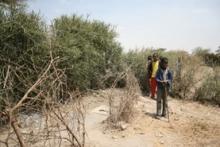Ethiopia
This case study focuses on the less documented faecal sludge reuse interventions in Ethiopia: Arborloo and Fossa Alterna, as implemented in East Arsi and Eastern Hararghe, in the Central Rift Valley, and in Arba Minch.
The case study is part of the MUStRAIN case study series in which the uptake of Multiple Use Services (MUS) in different contexts within Ethiopia is being documented. The case studies analyse cost-benefit relations as well as opportunities and challenges for implementation of MUS.
Both water and sanitation and food are recognised as human rights, that every citizen is entitled to enjoy. Our professions, governments and agencies work diligently, but mostly separately on these two issues. In some places, such a clear separation of efforts is not always possible or sensible though. Water and food are especially closely linked in rural and peri-urban areas in low income countries, and here, efforts to improve access to water and food security demand integrated components that build on the potential synergies. Families integrate their own efforts after all, and many traditional water supplies schemes cater for multiple uses. To maximize the developmental impact of their work, this is something that professionals and organisations need to get better at too. This article highlights one the productive use of domestic water supplies where such a coordinated approach is required, and illustrates it by case studies from Ethiopia.
There is reasonably wide recognition of the potential merits of multiple use water services (MUS) in Ethiopia as a result of innovation by NGOs and advocacy by research institutes. The acronym ‘MUS’ is itself increasingly a part of the sector discourse and interest in MUS is on the rise given the growing awareness that food insecurity and water insecurity are related. However, MUS interventions and modalities have generally not been scaled up widely in the country. This seems largely due to the same barriers that MUS faces elsewhere: the conventional institutional structuring of water policies, water services implementation programs, and professional disciplines into fragmented, parallel operating ‘vertical’ sectors of single water uses such as rural water supply and agriculture. Three best-bet opportunity areas are identifed for taking MUS forward. In addition, there is an opportunity for a learning network on MUS focusing on policy and practice in Ethiopia to learn from and leverage the activities of various partners.
Providing access to clean water and better sanitation for the poor is a global concern. But access alone is insufficient to reduce poverty. The RIPPLE programme produced a video entitled Money into Water, Water into Money, which looks at improved access and poverty reduction in both rural and urban environments in Ethiopia. Understanding links between availability, access and use of water and sanitation is crucial to the challenge of achieving pro-poor economic growth.
Go to YouTube: https://www.youtube.com/watch?v=KglVKCDkK9M
Powerpoint presentation given at the MUS group meeting in 2011 in Rome by Ard Schoemaker, RAIN Foundation, on rainwater harvesting in Ethiopia.
Mastewal Ademe presented options for rainwater management for a chain of water uses, based on experiences in Ethiopia.
In this presentation Zemede Abebe and Marieke Adank look into the incremental costs and benefits of different pathways of developing MUS in Ethiopia.
Globally, 1.1 billion people rely on unsafe drinking water sources from lakes, rivers, and open wells. Studies have confirmed that water related diseases not only remain a leading cause of morbidity and mortality worldwide but that the spectrum of disease is expanding and the incidence of many water related microbial diseases are increasing. Thus, this study was conducted to assess contamination level of water and determine the major sources of contaminants at collection points. Three sites of three springs and four sites of river water from Yubdo-Legebatu PA were selected for this study.
This study is aimed at evaluating the efficiency of slow sand filtration (SSF) in clay pots in removing total and thermo-tolerant/faecal coliform bacteria and reducing turbidity and assessing the contamination level at the point-of-use at home in the central highlands of Ethiopia (Yubudu-Legebatu PAs).
The RAIN Foundation submitted a request for technical assistance on the inclusion of MUS in their rainwater harvesting programme in Ethiopia. RiPPLE, through the HCS, provided such support and recommended the programme to include water for livestock.

